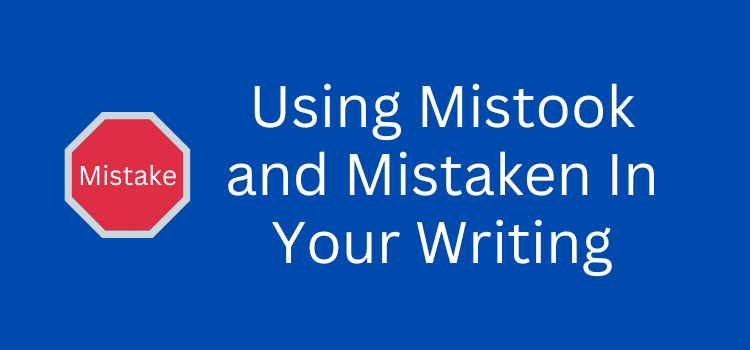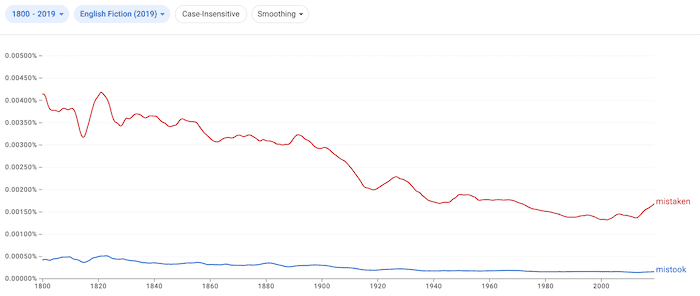
Mistook and mistaken are good examples of why your choice of words can make all the difference in how clearly and effectively you convey a message.
It is especially true when it comes to verbs, which are the backbone of a sentence because they indicate an action.
We often use mistaken, perhaps by habit.
But there are several reasons why mistook is sometimes a better choice.
The difference between mistaken and mistook
What’s the difference between the two verbs?
Both are verb forms of mistake and follow the same grammatical pattern as the verb to take.
Take, took, taken.
Mistake, mistook, mistaken.
Mistook is the simple past tense of the verb mistake, which means to misunderstand or misinterpret something.
For example, “I mistook her for my sister” implies that the speaker incorrectly believed the person they saw was their sibling.
On the other hand, mistaken is the past participle, and we use it to describe a state of being or an action resulting from misunderstanding.
For example, “He was mistaken in his thinking that his report was due next week” means that the person was incorrect in assuming the due date.
So why is mistook sometimes a better choice in writing?
Let’s look at a few reasons to help you.
Clarity
Using mistook instead of mistaken can help to make your writing clearer and more concise.
Mistaken can make some sentences a bit wordy and may not be necessary in some contexts.
For example:
I’m sorry. I mistook you for my neighbor.
I’m sorry. I was mistaken. I thought you were my neighbor.
The first sentence is clear and to the point.
But the second sentence is much wordier.
We often use “I was mistaken.”
But the reader doesn’t know what the speaker was mistaken about.
So the sentence then requires additional information to clarify it.
More active voice
Mistook is an active verb, while mistaken is a passive participle.
Using mistook can help to make your writing more active and engaging.
Here’s an example.
I mistook the time and missed my appointment with my doctor.
I was mistaken about the time of my appointment, so I arrived late and missed seeing my doctor.
The first sentence is more engaging and focuses on the person who made the mistake.
The second sentence is passive, focuses on the mistake, and is more wordier than necessary.
Active voice is often more effective in writing because it conveys a sense of action and agency.
Consistency
Using past simple verbs can help to maintain consistency in your writing.
You probably use the past tense a lot, especially in fiction writing,
So it makes sense to consider using mistook instead of switching back and forth between active and passive voice.
Consistency in writing helps to create a sense of coherence and clarity.
Examples of mistook in a sentence
You might not have thought about using the past simple verb.
But there are situations when it is the most appropriate form.
Here are a handful of examples.
I mistook her for her sister because they looked so alike.
Claude mistook my silence for agreement, but I was actually just thinking.
Susan mistook his shyness for disinterest and missed out on a chance to get to know him better.
He mistook my meaning and thought I was criticizing him when I was praising him.
The witness mistook the suspect for someone else and provided a false identification.
The boys mistook the warning for a joke and didn’t take the danger seriously.
In these sentences, the action of the subject is clear, and they are more concise compared to passive sentences.
Usage
There’s no doubt that the past participle is more favored, especially in fiction writing.
You can see from this graph that mistook has a lower frequency of use.

There are a few reasons for this.
One is that mistaken is also an adjective, so it increases its usage considerably.
Examples include mistaken identity, mistaken assumption, and mistaken belief.
Another is that it is sometimes impractical to use the past simple form.
This can happen when a sentence uses a perfect form.
We had mistaken the instructions and ended up lost.
The sentence is in the past perfect tense, indicating an action that happened before another action in the past.
Using the past simple in this sentence would change the tense and meaning of the sentence.
One last reason is that was mistaken is often a form of idiomatic expression that conveys a sense of acknowledging a past error.
I thought I was on the right bus, but I was mistaken.
In this sentence, it would be problematic to rewrite it using mistook.
Summary
Perhaps mistook is a verb that sounds a little old-fashioned or has been somewhat forgotten.
But in most forms of writing, it can sometimes be a better verb choice.
It can help to make your writing clearer, more active, and more consistent.
But it’s not the easiest verb to use and requires a bit of thought to construct active sentences.
However, always choose the verb that best fits the context and tone of your text.
Related Reading: Login, Log In, Or Log-In? Which One Is Correct In Writing?



